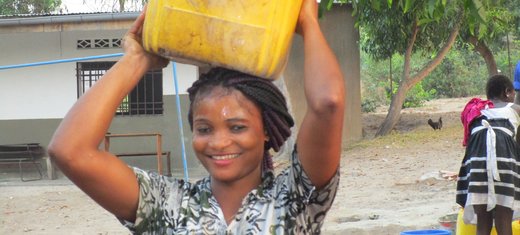
Happy woman with clean water









In 2015, we set up solar panels to provide electricity and water cisterns to collect rain water during the rainy season. However, our students and the patients who come to our medical center continued to suffer from waterborne diseases such as dysentery, typhoid fever, and cholera, which kill one out of six children in the DRC every year. According to the World Health Organization, in 2015 alone, there were over 19,000 cases of cholera in the DRC, and over 70% of victims were children. During the annual dry season, which lasts 3-4 months, the only water source for our center was a small spring at the bottom of a steep hill.
In the nearby village with an estimated 3,000 inhabitants, women would walk downhill several kilometers over difficult bush terrain to reach a spring of water where they would fill their containers, which then had to be carried back uphill to their homes. That water, used for cooking and drinking, had already been polluted at the spring where women also wash clothes and children bathe.
The
Solution
The good news is that we found a solution! Contrary to what we had
been told previously, after conducting a geo-electric field survey, specialists
informed us that it is possible to
build a bore well equipped with a solar pump and several outlets for people to
collect clean drinking water.
Our vision was to set up a clean water distribution system at Espoir Congo school/medical center, where the Kikimi village population would be able to access clean water. Our initial goals were to drill a well equipped with a solar pump, a water tower with two cisterns and two water fountains in Kikimi, on the Espoir Congo site, which has a primary school, a secondary school and a medical center.
Our objective was to provide access to clean water to 350 students, over 500 medical patients, 100 women in our maternity and approximately 3,000 inhabitants.
Realization of the Project:
April-July 2018
Thanks to the prayers and support of many friends, these goals have now been reached.
We would like to also thank the technicians and experts for their outstanding
work, including bringing a doable and green solution to what seemed for years
to be an impossible situation.
The steps that were taken to complete this project included:
1. Drilling for water and installing bore
well pipes
2. Water first reached and tested
3. Building of a 6-meter-high water tower
and installation of cisterns
4. Installation of solar panels and
imported solar pump
5. Water distribution system, including
building of two water fountains
Impact
Installing a well with a solar pump is a dream come true for the
population, who had up until this point not had access to clean water. They
came rushing as soon as water was first reached and could not wait for it to be
tested. It will better the living conditions and quality of life of the entire population
of Kikimi, including that of the orphaned and vulnerable children. Access to
clean water will result in a healthier population: kids will study better,
parents will work more effectively, mortality will decrease, and the standard
of life (HDI) will increase.
Using this innovative green technology (solar pump) is setting an example which can be replicated in other villages in the DRCongo and throughout Africa, without the use of costly and polluting fuel, while ensuring a continuous supply of clean drinking water, thereby giving new hope to this population.
Published in 2019.